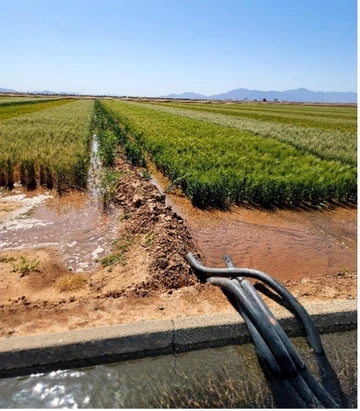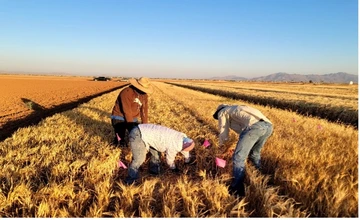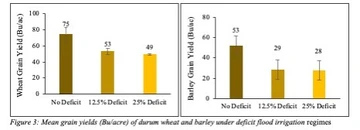Deficit irrigation is often considered an effective irrigation strategy to conserve water and has been tested in different crop production systems and under different environments. In this research study, we explored the impact of deficit irrigation in the arid Southwest region, particularly in central Arizona, on the production of durum wheat and grain barley using flood irrigation. The experiment was conducted at the University of Arizona Maricopa Agricultural Center in Maricopa, Arizona. We examined irrigation deficits of 12.5% and 25% and observed that a 12.5% deficit in irrigation led to 30% and 45% decline in grain yield for durum wheat and barley, respectively; however, the yield did not decline further under the 25% deficit irrigation treatment. Additionally, we did not record any changes in soil chemical properties or soil health. Our study concluded that under flood-irrigated durum wheat and barley, deficit irrigation may not be an economically viable strategy for water conservation in desert agroecosystems. However, this research also highlighted the need for similar research on drip- and sprinkler-irrigated small grain production systems.
Desert agricultural systems are facing continuous challenges from the megadrought (Williams et al., 2022) and diminishing water availability in irrigated agricultural production systems, inspiring researchers to explore water saving techniques. Deficit irrigation has been tested successfully in grain production systems (Memon et al., 2021); however, there is a knowledge gap in understanding the effect of deficit irrigation on major small grain crops in desert environments. Therefore, this study provides useful knowledge for the adoption of irrigation practices that can mitigate freshwater consumption. Additionally, small grain crops have been reported to improve soil health (Jernigan et al., 2020), but little information is available regarding their impact in desert environments. We designed this study to investigate the growth and influence on soil health of two major winter small grain crops, durum wheat and barley, under deficit irrigation regimes in Arizona. Additionally, this study is based on the hypothesis that soil health improvement might facilitate freshwater savings. Our research outcomes will help the industry fine tune agronomic management practices to become more climate resilient under water-limited scenarios.
Methods
Experimental layout
The experiment was laid out at the University of Arizona Maricopa Agricultural Center (MAC), in a 2-acre field following a randomized complete block design during the spring of 2023. Due to the wet winter season in 2022-2023, the crops were planted late in the season, on February 14, 2023, which may have impacted the crop performance. We initially conducted a randomized replicated research trial to understand the effects of deficit flood irrigation regimes, 15% and 30% deficit irrigations, on (i) grain yields and protein content of barley and durum wheat, (ii) soil chemical properties, and (iii) soil health indicators (potentially mineralizable nitrogen, soil respiration, permanganate oxidizable carbon, and soil protein). We cultivated two popular varieties, TIBURON desert durum wheat and BARETTA barley, for this trial. For durum wheat and barley, the seeding rates were 150 lbs./acre and 170 lbs./acre, respectively.

Figure 1. Wheat and barley plots are getting irrigated at the Maricopa Agricultural Center
Irrigation and fertilization
A total of 8 irrigations were applied to the control plots, whereas for the deficit regimes, 7 and 6 irrigations were applied. The deficit treatment was applied by skipping a flood irrigation event on April 19 for both deficit treatments, 15% and 30% deficit, and on May 10, 2023, only for the 30% deficit irrigation treatment. However, due to the delayed planting and harsh summer, we could only apply a 12.5% and 25% deficit irrigation, while we initially targeted 15% and 30% irrigation deficit. Control plots for both crops received 3.5 acre-feet (42 inches) of water during the growing season, averaging ~5.25 inches of water per irrigation. The irrigation was handled by irrigators at MAC, who used siphon tubes for flood irrigation, which did not permit precise monitoring of the flow rate, but rather an estimation based on the duration of irrigation and the water depth in the ditch. However, for future studies, it is recommended to use a more precise quantification of water use.
The initial soil test nitrate level was 28 lbs. N/a. A total of 200 lbs. N/a. was applied as Urea Ammonium Nitrate (32-0-0), split into four applications: 75 lbs. at planting, 50 lbs. on April 4 and April 26, and a final dose of 25 lbs. N/a was applied on May 19 to boost grain protein contents and minimize the adverse effects of delayed planting and a shorter growing season. Fertilizers were applied through irrigation, only on days when all plots were scheduled to be irrigated to ensure all plots received similar amounts of nutrients. However, to ensure better uniformity of fertilizer application, we used a slower rate of irrigation, and plots with shorter lengths (~380 feet), but still, we could not guarantee an ideal uniform application. Phosphorus (P) fertilizer was applied as mono ammonium phosphate (MAP or 11-52-0) which is the typical P source used in the area at the same rate that is used by the growers in central Arizona, i.e., 75 lbs. P2O5 per acre (37.5 kg P/ha) (Ottman, 2020)
Soil and plant tissue sampling
Soil samples were collected from the top 0-6” soil profile and then processed at the Soil health lab at MAC. We measured the following parameters to monitor soil health and crop growth: Potentially Mineralizable Nitrogen (PMN), Soil Organic Matter (SOM), Permanganate Oxidizable Carbon (POX-C), soil respiration, soil protein, pH (1:1) and electrical conductivity, soil nitrate-ammonium, nutrients, and plant tissue nutrient composition.
PMN is an indicator of the capacity of the soil microbial communities to mineralize nitrogen (N) tied up in complex organic residues into the plant-available forms of N.
Microbially active carbon or POX-C is an indicator of the small fraction of SOM that can serve as a readily available food and energy source for the soil microbial community, thus helping to maintain a healthy soil food web to support optimum microbial activity.
Soil respiration is a measure of the metabolic activity of the soil microbial community. As the microbes respire or decompose SOM, CO2 is evolved, and this test measures CO2 evolved during microbial metabolism as an indicator for soil microbial activity.
Soil protein is an indicator of the amount of protein-like substances in the soil. Soil protein is a large pool of organically bound N in the SOM which soil microbes can mineralize. Therefore, protein content is well associated with overall soil health status, especially the N and carbon in the soil.
Soil health parameters were measured at the Sanyal Lab using protocols described in Sanyal et al. (2023), and soil samples were sent to a commercial lab for soil chemical analyses. Plant samples were collected at the physiological maturity stage and sent to a commercial lab for nutritional analyses, especially protein.
Harvest and yield
The crops were harvested on June 22, 2023. To calculate grain yields, 5 random microplots were harvested inside each treatment plot. The dimensions of each microplot were 3.28 ft. x 3.28 ft. (1.0 m x 1.0 m). The samples with grains were then threshed at the MAC, and the grains were weighed and sent out to a commercial lab for nutrient analyses.

Figure 2. Stackpole and the farm crew harvesting microplots for grain yield and quality analyses
Statistical analyses
Preliminary data analyses were conducted in MS Excel to calculate mean values and standard deviation.
Results and discussion
Chemical soil properties
Data from initial soil properties are given in Table 1. The soil was medium textured and alkaline, but soluble salt concentration was low. We did not see any changes in soil chemical properties during the experiment; however, we expected salt build-up in experimental plots where we applied deficit irrigation regimes. Notably, we had low plant-available P levels before the experiment, and the levels were exhausted by the crop further. Very low plant available P levels at the reproductive stage may also suggest that the crops could have utilized an additional application of P fertilizers (Table 1). Similarly, plant available K was taken up by the crops. We also concluded that our N fertilizer application strategy was correct as the crop assimilated most of the N applied to the soil as evident from the residual soil nitrate-nitrogen levels after the harvest. No change in soil organic matter levels was observed. From these results, we can conclude that deficit irrigation did not change soil chemical properties or soil fertility levels in manners that were detrimental to crop growth.
Table 1. Mean values for soil chemical properties at the beginning of the trial and after grain harvest
Reproductive | Post-harvest | ||||||
|---|---|---|---|---|---|---|---|
Soil | Initial | Control | 12.5% | 25% | Control | 12.5% | 25% |
Soil pH (1:1) | 8.4 | 8.3 | 8.3 | 8.3 | 8.4 | 8.4 | 8.4 |
Soluble Salts (dS/m) | 0.2 | 0.3 | 0.2 | 0.2 | 0.2 | 0.2 | 0.2 |
Organic Matter (%) | 1.0 | 1.0 | 1.0 | 1.0 | 1.0 | 1.0 | 1.0 |
Nitrate-nitrogen (lbs./a) | 28 | 5.7 | 5.9 | 2.6 | 2.8 | 2.6 | 2.9 |
Olsen P (ppm) | 4.5 | 0.2 | 1.0 | 0.8 | 0.9 | 0.8 | 1.3 |
Potassium (ppm) | 313 | 223 | 206 | 210 | 205 | 195 | 204 |
Sulfate-S (ppm) | 22 | 20 | 21 | 17 | 19 | 17 | 21 |
Zinc (ppm) | 0.6 | 0.5 | 0.5 | 0.5 | 0.4 | 0.4 | 0.5 |
Grain yield and quality of durum wheat and barley
Durum wheat and barley grain yields were drastically reduced with just a 12.5% irrigation deficit under flood irrigation systems; increasing the deficit did not decline the yields further. We documented a 30% decline in grain yield for durum wheat and a 45% decline for barley (Figure 3) when a 12.5% deficit was applied. We did not find any significant difference in grain protein content. The grain protein content was 15, 17, and 16% for barley, and 18, 19, and 19% for durum wheat, under control, 12.5%, and 25% irrigation deficit treatments, respectively; we found similar effects on other quality parameters (Table 2). These outcomes make it evident that deficit flood irrigation may not be a sustainable nor economically viable practice for growers as potential yield reductions may offset the cost of growing durum wheat and barley. Our finding is similar to many previous reports that indicated wheat grain yield loss following deficit irrigation (Ali et al., 2007; Tari, 2016). However, our findings were more drastic because of the extreme arid environment of Arizona.
The 2023 average durum grain yield in the state of Arizona was 103 Bu/a (USDA NASS 2024), but our average durum grain yields were lower, possibly due to the wet winter/spring that delayed our planting and shortened the growing season. The highest durum grain yield in our experimental plots was 85 Bu/a. Barley grain yield was reduced by a comparatively larger amount due to the late planting. The average barley grain yield in Arizona was 132 Bu/a in 2023 (USDA NASS 2024), whereas our average yield was only 53 Bu/a, and the highest barley grain yield we recorded in our experimental plots was 64 Bu/a. These outcomes may suggest that a late planting of small grain crops grown for grain yield may not be economically viable as suggested in many studies previously (Shah et al., 1994; Shah et al., 2020). Therefore, it might be necessary to measure the impacts of similar deficit irrigation regimes on grain yields when durum wheat and barley were planted at the right time.

Table 3. Mean values of Potentially Mineralizable Nitrogen (PMN), Permanganate Oxidizable Carbon (POX-C), soil respiration, and soil protein before the experimentation and after the grain harvest
|
| Reproductive | Post-harvest | ||||
|---|---|---|---|---|---|---|---|
Soil | Initial | Control | 12.5% | 25% | Control | 12.5% | 25% |
PMN (µg NH4 /g soil) | 3.60 | 2.2 | 1.8 | 1.3 | 1.3 | 0.9 | 2.4 |
POX-C (mg C/kg) | 251 | 211 | 219 | 174 | 230 | 309 | 368 |
Soil Respiration (mg CO2/g/4d) | 1.23 | 1.01 | 1.01 | 1.38 | 1.06 | 1.07 | 1.00 |
Soil Protein (g/kg soil) | 0.45 | 0.29 | 0.24 | 0.15 | 0.16 | 0.27 | 0.37 |
Soil health assessments
We did not find a particular trend for soil health changes in our study under different irrigation regimes and for different small grain crops, durum wheat, and barley. However, we found that POX-C levels declined during the reproductive stage and increased afterward (Table 3). It can be speculated that during the reproductive growth stage, higher soil microbial activity to cycle nutrients (Table 1) exhausted the POX-C source for energy. Then, after physiological maturity, the crop did not need more nutrients, and soil microbes in the rhizosphere were therefore signaled by the crops to not provide nutrients, and soil microbes decomposed other carbon forms in leftover carbonaceous plant tissues, which added to the POX-C levels post-harvest. A similar trend was found for soil protein levels in the deficit treatments, and a contrasting trend was found in control plots; however, soil protein levels declined as the crop grew, possibly due to microbial utilization of the soil N reserve that helped plants avail nitrogen as needed (Geisseler et al., 2019). Several scientific reports can support these theories (Robertson et al., 1997; Sainju et al., 2022; Liu et al., 2023), though, we do not have any supporting evidence from this study as we did not measure soil microbes or their activities.
Conclusion
Overall, our study concludes that deficit irrigation strategies may not be sustainable or economically viable for durum wheat and barley grain production systems, especially under flood irrigation. We reported drastic yield loss even with 12.5% deficit irrigation. We also did not find any grain quality benefits from reduced yield. Deficit irrigation did not affect soil chemical properties or soil health. However, further studies should investigate soil biology, especially the soil microbial communities and their functions. The outcomes of this study indicated that future research should investigate other irrigation methods such as sprinkler and drip irrigation methods for more effective deficit irrigation regimes.
References
Ali, M. H., Hoque, M. R., Hassan, A. A., & Khair, A. (2007). Effects of deficit irrigation on yield, water productivity, and economic returns of wheat. Agricultural water management, 92(3), 151-161.
Geisseler, D., Miller, K., Leinfelder-Miles, M., & Wilson, R. (2019). Use of soil protein pools as indicators of soil nitrogen mineralization potential. Soil Science Society of America Journal, 83(4), 1236-1243.
Jernigan, A. B., Wickings, K., Mohler, C. L., Caldwell, B. A., Pelzer, C. J., Wayman, S., & Ryan, M. R. (2020). Legacy effects of contrasting organic grain cropping systems on soil health indicators, soil invertebrates, weeds, and crop yield. Agricultural Systems, 177, 102719.
Liu, Q., Wang, J., Wu, A., Sun, A., Dong, E., Wang, Y., ... & Jiao, X. (2023). Plant-associated microorganisms during the reproductive period best predict sorghum yield and quality. Field Crops Research, 304, 109167.
Memon, S. A., Sheikh, I. A., Talpur, M. A., & Mangrio, M. A. (2021). Impact of deficit irrigation strategies on winter durum wheat in semi-arid climate of sindh. Agricultural Water Management, 243, 106389.
Ottman, M. J. (2020). Fertilizing small grains in Arizona. College of Agriculture and Life Sciences, University of Arizona. az1845-2020. http://hdl.handle.net/10150/669954
Robertson, G. P., Klingensmith, K. M., Klug, M. J., Paul, E. A., Crum, J. R., & Ellis, B. G. (1997). Soil resources, microbial activity, and primary production across an agricultural ecosystem. Ecological Applications, 7(1), 158-170.
Sainju, U. M., Liptzin, D., & Stevens, W. B. (2022). How soil carbon fractions relate to soil properties and crop yields in dryland cropping systems?. Soil Science Society of America Journal, 86(3), 795-809.
Sanyal, D., Mukherjee, A., Rahhal, A., Wolthuizen, J., Karki, D., Clark, J. D., & Bly, A. (2023). Cover crops did not improve soil health but hydroclimatology may guide decisions preventing cash crop yield loss. Frontiers in Soil Science, 3, 1111821.
Shah, S. A., Harrison, S. A., Boquet, D. J., Colyer, P. D., & Moore, S. H. (1994). Management effects on yield and yield components of late-planted wheat. Crop science, 34(5), 1298-1303.
Shah, F., Coulter, J. A., Ye, C., & Wu, W. (2020). Yield penalty due to delayed sowing of winter wheat and the mitigatory role of increased seeding rate. European Journal of Agronomy, 119, 126120.
Tari, A. F. (2016). The effects of different deficit irrigation strategies on yield, quality, and water-use efficiencies of wheat under semi-arid conditions. Agricultural Water Management, 167, 1-10.
USDA NASS. (2024). 2023 State Agriculture Overview: Arizona (accessed 04-01-2024). https://quickstats.nass.usda.gov/
Williams, A. P., Cook, B. I., & Smerdon, J. E. (2022). Rapid intensification of the emerging southwestern North American megadrought in 2020–2021. Nature Climate Change, 12(3), 232-234.

